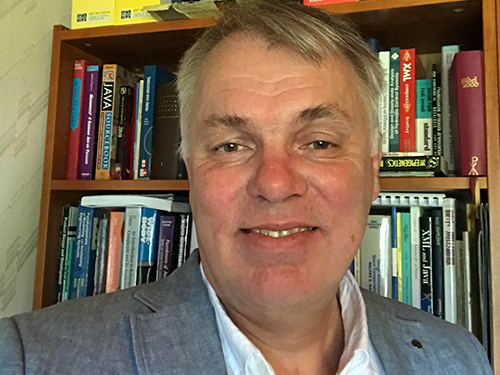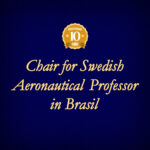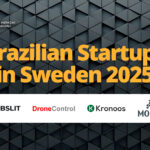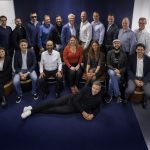Since 2010, Professor Petter Krus has been promoting the connection between institutions of the two countries with outstanding results in several area.

“I still have some loose threads,” Petter Krus jokes as he looks back and briefly reviews his work in Brazil. Although performed in a relaxed manner, the statement shows the disposition of the smiling Linköping University (LiU) professor. After all, instead of contenting himself with the enormity of projects in which he has been directly or indirectly involved over nearly eight years of working with Brazilian institutions, Petter ends his first major cycle of activities in Brazil with a feeling that there are still important things to do.
The numbers are impressive. Since December 2010, six projects involving high technology and other initiatives are being developed in partnerships between Brazilian and Swedish universities and companies. Among the highlights is MSDEMO (Methods for Sub-Scaled Demonstrator and Control Law Testing) which is being carried out by researchers from LiU, ITA (Aeronautical Institute of Technology) and USP-EESC (School of Engineering of São Carlos of the University of São Paulo) and whose focus is the creation of methods for the development and testing of subscale demonstrators, as well as the development and validation of flight control laws.
In total, these projects count with the direct participation of no less than 31 Brazilian and Swedish academics, from professors, specialists, postdoctoral fellows and master’s and doctoral students. The work, which also included professionals from the industrial segment of both countries, already made it possible to raise significant funding and moreover resulted in the production of eight academic articles. And there are more: four Swedish and five Brazilian institutions have already signed institutional agreements, reinforcing the rapprochement between the two countries. All this since Petter’s arrival in Brazil.
Success Story
Holding a bachelor’s degree in Mechanical Engineering from the Linköping University in 1982, Petter Krus soon set out on his academic career. He completed his PhD in Fluid Power Systems six years later and, in 1992, he was a full professor at LiU, a role which he never left. With a calm voice and serene look, he soon stood out for his role alongside young investigators. His profile, that indicates a propensity to aggregate, as well as his expertise working with companies of the size of Saab AB, attracted the attention of Alessandra Holmo, Managing Director of CISB, who started to count with the Professor’s support for the first projects of the entity that was still being structured.
“Before coming to Brazil, I knew nothing about the country, except for the most obvious things, like soccer,” says Petter. His attention was drawn to the ease of connecting with people. When, by invitation of CISB, he got to know the academic environment, more specifically the universities of ITA, EESC-USP, UFSC (Federal University of Santa Catarina) and UFABC (Federal University of ABC-SP) he became even more enthused. “The students are eager to learn,” he says.
In these first missions to the country, Petter began to establish his contact network that would soon be consolidated in programs emphasized in three major areas: bilateral research, structuring of long-term collaboration and joint education (courses, student supervision, mentoring young teachers and promotion of student exchange). But the great advance occurred in 2015, when the Swedish professor was awarded a three-year chair at ITA. Since then, the work of approaching Brazilian and Swedish professors and students has been intensified, in a work plan that has yielded several results.
Results
In addition to MSDEMO, another project that fills Petter with pride is the Center for Technological Convergence of Santa Catarina, SC2C.Aero, which began activities in May this year and is the result of a joint effort with Professor Victor de Negri, from UFSC, with whom he built a great friendship. The center, organized by research groups from UFSC and the CERTI Foundation, is defined as a network aimed at stimulating cooperation with and between innovative companies that demand technological solutions and their qualified offers.
“I really enjoyed working with Brazilian professors, because they are very receptive,” says Petter. “In Brazil, I can develop ideas that I would normally not have time to work on in Sweden, because of the students that I have to supervise,” he explains. The academic still fondly remembers the master’s program in Engineering and Innovation Management, which he helped establish at UFABC. “The first student graduated at the end of 2017 and I had the opportunity to closely follow the entire course,” he says.
More than academic results, Petter says he is proud of the connections made in the country. “From trust, we can work well together, and that’s what I got from my contacts here,” he says. He highlights the importance of his work in bringing Brazil closer to the world’s major technological centers. “Brazil is so far from everything, and these actions help bring the researchers closer to the international scene,” he says, aware that his almost one decade long participation has been being decisive to take the country to a new level regarding scientific research and innovation.




